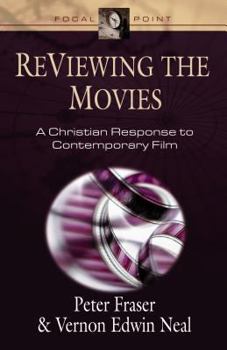ReViewing the Movies: A Christian Response to Contemporary Film
Select Format
Select Condition 
Book Overview
Rather than condemning Hollywood for its depravity and decrying all movies, these two film experts have taken a new look at the movies and help us evaluate them on a truly biblical scale.
Format:Paperback
Language:English
ISBN:1581342039
ISBN13:9781581342031
Release Date:October 2000
Publisher:Crossway Books
Length:187 Pages
Weight:0.55 lbs.
Dimensions:0.5" x 5.5" x 8.5"
Customer Reviews
1 rating
To Watch or Not to Watch
Published by Thriftbooks.com User , 15 years ago
What movies should Christians watch? Is there a litmus test that can be applied to movies to determine the rightness or wrongness of certain movies? How does a Christian interact with "one of the most powerful cultural influences in America?" In "Reviewing the Movies: A Christian Response to Contemporary Film," Peter Fraser and Vernon Edwin Neal tackle this issue head on in an attempt to help Christians understand both the methodologies and the worldviews portrayed in the theater. What the reader won't find is a checklist of things to look for in determining whether or not he should watch this movie or that one. Instead of providing criteria that paints options either black or white, good or bad, the authors point to the heart of the matter - both the readers' and the movies' worldviews. They state that "the problem in America can be blamed in part on how we have been trained to think about `religious issues.'" They argue that instead of taking the easy road in compartmentalizing things like movies as either "Christian" or "non-Christian," we should be actively engaging the culture, looking for truth to be portrayed whether that truth is pretty or not. Throughout the book, reviews and pictures of both classic and contemporary movies are offered as examples of excellent or poor worldviews as portrayed in the theater. At the beginning of the book, the authors make some important points in the criteria often used by Christians in determining whether or not a movie is "good." The criteria used is either requiring that the movie be made by a Christian, requiring that the subject matter be blatantly Christian, or that there are obvious symbols of Christianity within the movie. Each of these criteria has their own problems to deal with and the authors discuss each of them in turn, commenting on the double standards inherent with many movies that may indeed fit one or more of the criteria. The authors' main concerns in how we view movies are the movie's quality of production and the movie's "overall meaning and significance." The bulk of the book revolves around dealing with these two issues. Subsequent chapters provide a better understanding of both the artistry of film production (why was this particular angle chosen, etc), and why certain thematic elements are included (such as the element of love, religion, children's points of view, etc). The authors often seem to be tackling culture rather than movies, but considering that movies make up such a huge part of our current culture, this is no surprise and they shouldn't be faulted for it. The book continuously brings the reader back to what the Bible says about truth, goodness, beauty, love and the gospel. And the authors make an excellent point in saying that "as Christians we needn't blush at the immodesty of stating up front what we consider good. We should, in fact, do so gladly; after all it is part of our witness to the world." Perhaps a little lacking in this book is what the authors do inde






